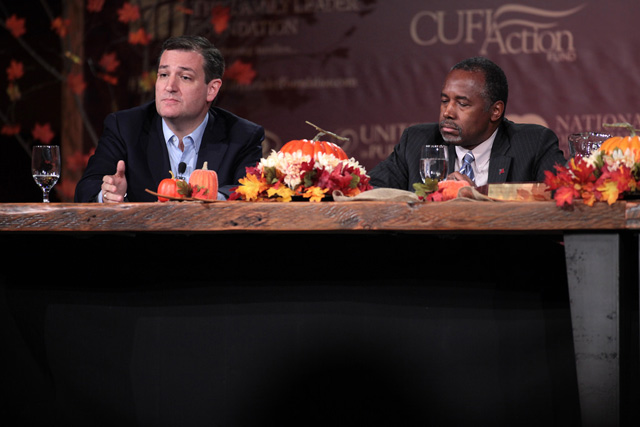Trump speaking at the 2015 Conservative Political Action Conference (CPAC) in National Harbor, Maryland (Gage Skidmore)
By Josiah Omotosho
On September 25, with the eyes of the world on New York City as it hosted Pope Francis and on Speaker of the House John Boehner as he called what turned out to be a seminal press conference, the Values Voter Summit in Washington DC began. With numerous presidential hopefuls set to speak at the summit, Donald Trump decided he needed to make distinctive gesture to set him apart from the rest. And so the real estate mogul began his speech by displaying a black, leather-bound with his name emblazoned on the front; it was given to him, he said, by his mother, whose handwriting was clearly visible just inside the cover.
“I saw this and I said, ‘I have to bring this and show it’ because it brings back so many memories,” said Trump. Whether that really was how he came to appear on stage with a Bible, it was clear that in a gathering of socially conservative and overwhelmingly religious voters, Trump had to find some way to stand out from the likes of Ted Cruz, Marco Rubio and Mike Huckabee, all three of whom had more experience dealing with this demographic of voter.
And really, who could blame him?
Since the formation of the Moral Majority in 1979, the Christian right has proven itself a demographic to be reckoned with in the world of electoral politics. Once capable of actually deciding general elections – just ask Jimmy Carter and Ronald Reagan – the power of the Christian right has since been eroded, except in Republican partisan politics, where they remain a formidable force, as evidenced in the growth of entities such as the Tea Party and the Freedom Caucus.
Its influence is perhaps no more clear than in the annual Values Voter Summit where numerous potential Republican nominees go to make a pitch for why they should be president. It seems that, despite not being particularly representative of Republican voters at large, the evangelical right still commands immense attention and respect from the party establishment. Just look at Trump’s closest opponent in the primary race, Ben Carson.
The former neurosurgeon was, at one point in the race, able to parlay his religiosity into a virtual tie with Trump in polling among likely Iowa caucus voters. Carson posits that the pyramids of Egypt, widely understood to have been constructed under the orders of various Pharaohs to serve as burial chambers, were instead all created by the biblical figure of Joseph to store grain in preparation for an impending near-decade famine.

Ben Carson and Ted Cruz at 2015 Presidential Family Forum in Des Moines, Iowa; picture taken by Gage Skidmore
Carson claims that his Christianity proved key in eliminating his childhood violent tendencies and inclinations towards laziness, tendencies that culminated in him allegedly nearly killing a relative. He says he scored a 97 on a chemistry test that he otherwise should have been failed, had it not being for the intervention of an angel in his dream the night before, bearing the test answers.
He is also certain that homosexuality is a choice (“A lot of people go into prison straight and when they come out, they’re gay”). He promises to, if elected, instate a 10 percent flat tax rate based on the Biblical principal of tithing, and thinks Darwin’s theory of evolution was “something that was encouraged by the adversary” – “the adversary” here being the Devil. He is, as of the writing of this piece, second in most polls among likely Republican primary voters nationwide and second in most polls among likely Republican primary voters in Iowa. In late October, when asked by the Des Moines Register/Bloomberg Politics pollsters why voters like Ben Carson, 89 percent of respondents claimed to be encouraged by his promise to be guided by his faith in God.
That a candidate’s “faith in God” is being judged is a fact not lost on the other candidates. Much earlier in the race, before it became clear that Carson and Trump were the uncontested frontrunners, the controversy surrounding Kim Davis proved a premier opportunity for candidates looking to appeal to evangelical voters, and no one seized on the chance more than Mike Huckabee, who organized a rally for Davis to be held immediately after her release from a five-day stint in jail for contempt of court. Fellow candidate Ted Cruz was allegedly physically barred from taking the stage by a Huckabee aide. After all, “[Cruz] is not free to come to an event that we’re putting together and invite himself on the program.” To share the glory, it seems, as champion of the pious is a cost at least some candidates are unwilling to pay –- a perception of religious solidarity be damned.
The question of who holds the true power in this relationship between the evangelical right and the Republican establishment is a complicated one. Is it the voters, whose ballot can make political careers, or break them beyond repair? Or is it those being voted on, whose public airs of devoutness look and sound suspiciously like par-for-the-course political theater?
The answer is not clear. However, one thing is: the evangelical right is deeply unhappy with today’s political climate, especially as it relates to social issues, and its influence will be felt during the upcoming primaries beginning February of next year. That it will be felt in the general election, however, is highly doubtful. Since the presidential elections of 1984, it seems like the “moral majority” isn’t that much of a majority after all.



